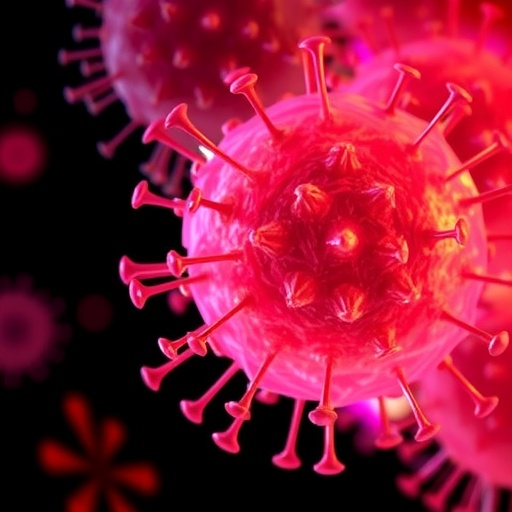Recent advancements in the field of genetics and environmental stress responses have opened new avenues for understanding the resilience of various species against pathogens. A groundbreaking study by Zhang et al. delves into the mechanisms by which non-lethal heat shock influences gene expression and enhances immunity in the freshwater crayfish, Procambarus clarkii. This research unveils the pivotal role of the COMMD gene, showcasing how its activation can bolster the organism’s defenses against pathogens.
The study meticulously explores the concept of non-lethal heat shock, which is characterized by a rise in temperature that does not exceed lethal thresholds. Such temperature increases can occur in natural habitats due to environmental changes. The researchers established a series of controlled experiments to simulate these conditions and observe the subsequent physiological and genetic responses in Procambarus clarkii. The implications of non-lethal heat stress have been largely overlooked, making this investigation particularly significant.
One of the key findings of the study is the activation of the COMMD gene following exposure to non-lethal heat shock. The abbreviation COMMD stands for “copper metabolism MURR1 domain.” This gene is crucial in various cellular functions, including the regulation of copper ion homeostasis and modulation of inflammatory responses. Increased COMMD expression in the crayfish was linked to a heightened state of readiness against potential pathogens that threaten their survival.
To assess pathogen defense, the researchers exposed the crayfish to various infectious agents after subjecting them to heat shock. The results demonstrated a marked increase in the resistance to infection. This newfound resilience is likely attributable to the upregulation of the COMMD gene, which encourages the activation of additional immune pathways. This pivotal discovery not only adds depth to our understanding of crustacean immunity but also highlights the potential for leveraging genetic responses in aquaculture practices.
In the realm of aquaculture, where diseases can decimate whole ecosystems, the study highlights a promising avenue for enhancing stock health. By utilizing non-lethal heat shock as a mechanism to boost immunogenic responses, aquaculturists could implement strategies that enhance the health and productivity of Procambarus clarkii. This approach could yield substantial economic benefits, given the growing market demand for healthy aquaculture products.
Moreover, this research arms scientists and aquaculturists with knowledge about climate change implications on aquatic species. As global temperatures rise due to climate change, understanding how species like Procambarus clarkii adapt can provide insights into managing ecosystems and preserving biodiversity. The comprehension of thermal stress responses can facilitate the development of species that are more resilient to changing environments, which is increasingly necessary in our warming world.
The study emphasizes the importance of genetic interventions and breeding programs in developing heat-resistant variants of crayfish that can thrive under higher temperatures. By fostering a breeding program focused on the COMMD gene and its pathways, it may be possible to create a new generation of crayfish that is not only more heat-tolerant but also better able to fend off pathogens. This potential breakthrough represents a significant shift in aquaculture practice, promoting sustainable and resilient farming techniques.
Interestingly, the research also opens the door to understanding the broader implications of gene activation and stress responses in other aquatic organisms. The mechanisms that underlie pathogen defense in Procambarus clarkii may share similarities with other crustaceans and marine species. This realization has far-reaching potential, paving the way for a new era of research that leverages genetic resilience to combat global changes in marine environments.
Additionally, the implications of the COMMD gene extend beyond just immune responses; it serves as a vital part of the cellular machinery that supports overall health in crayfish. By ensuring proper metal ion regulation and inflammatory response modulation, this gene plays an essential role in the organism’s metabolic processes. Investigating the intersections between immune response and metabolism could yield further breakthroughs in understanding how abiotic stressors influence health in various ecosystems.
As the world grapples with climate change and its cascading effects on biodiversity, the role of genes like COMMD becomes crucial. These insights could lead to innovative strategies to conserve aquatic life, ensuring that species not only endure environmental shifts but thrive in them. The adoption of such gene-focused approaches in conservation efforts could play a vital role in safeguarding aquatic ecosystems.
Notably, the research underscores the necessity of interdisciplinary collaboration. Geneticists, ecologists, and aquaculture experts must work jointly to explore the full potential of findings like those presented by Zhang et al. The convergence of these fields can facilitate the development of comprehensive strategies aimed at maximizing both biodiversity and the economic viability of aquaculture.
Furthermore, adopting a forward-thinking mindset with regards to genetic research may inspire new technological advancements in aquaculture. Innovations such as CRISPR and other gene-editing technologies may soon allow scientists to introduce beneficial traits into populations of crayfish, optimizing resistance to pathogens while maintaining ecological balance. This forward thrust in genetic engineering could reshape the aquaculture industry for generations to come.
In conclusion, the research presented by Zhang et al. showcases the intricate relationship between environmental factors and gene expression in Procambarus clarkii. Their findings stand to have profound implications for aquaculture and biodiversity conservation in an era of climate change. As the science community continues to unravel the genetic blueprint of aquatic organisms, we inch closer to understanding and protecting the delicate balance of our water ecosystems while meeting the demands of growing populations worldwide.
Subject of Research: The impact of non-lethal heat shock on gene expression and pathogen defense in Procambarus clarkii.
Article Title: Non-Lethal heat shock induces COMMD gene activation and enhances pathogen defense in Procambarus clarkii.
Article References:
Zhang, X., Cai, X., Yue, S. et al. Non-Lethal heat shock induces COMMD gene activation and enhances pathogen defense in Procambarus clarkii.
BMC Genomics 26, 1038 (2025). https://doi.org/10.1186/s12864-025-12205-5
Image Credits: AI Generated
DOI: https://doi.org/10.1186/s12864-025-12205-5
Keywords: COMMD gene, non-lethal heat shock, pathogen defense, Procambarus clarkii, genetic resilience, aquaculture, climate change.




